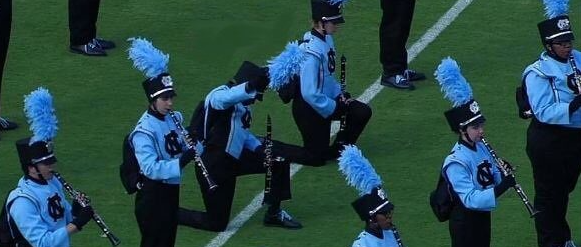Everyone in the country is well aware of the challenges we face regarding race, diversity, and equality. In response to the current racial climate in America, San Francisco 49ers quarterback Colin Kaepernick decided to protest during the national anthem. Unsurprisingly, there has been controversy surrounding Kaepernick’s protest. However, others feeling similar to Kaepernick have similarly protested during the anthem. With the beginning of college football, students at several campuses have joined the protests. In today’s post, I want to make the case that despite detractors, the anthem protests are in the best tradition of higher education.

Two protests during recent college football games recently struck a chord with me given my personal affiliations.
During SMU’s home game in Dallas against TCU, several members of the band kneeled while playing the national anthem.
Similarly, UNC band members took a knee during the national anthem at the university’s game against the University of Pittsburgh.
Predictably, some alumni and donors believe the student protest was disrespectful and should be condemned by the university.
In contrast, SMU released the following statement after the protest:
The strength of a great university is reflected in its commitment to the broad exchange of ideas and philosophies. SMU respects the diversity of opinions within the University and supports the right of free expression for each member of its campus community.
I am proud this was the response of my university. It would have been easy to suggest that students should have found another way to protest or claim that the students don’t represent the university.
Instead, the university reaffirmed its support for the broad exchange of ideas.
I’m sure this hasn’t been easy for the development office or the president, but it is absolutely the right call.
During my undergraduate years at the University of North Carolina, I was a member of the marching band. Being in the band was one of the defining aspects of my undergraduate experience.
I was always keenly aware (and our director would frequently remind us) that we were representatives of the university.
Student protests, challenging the status quo, and considering one’s role as a citizen are ideals that I learned at UNC.
The protesting band members were demonstrating that they have learned from their liberal arts education and are putting their education into practice.
They made me proud to be affiliated with both universities. They were also effective representatives of their universities.
We talk a lot about the vocational purposes of higher education. Should government pay for majors that don’t lead directly to specific careers? Should we evaluate colleges based on the salaries of their graduates?
Thomas Jefferson once wrote, “I know no safe depositary of the ultimate powers of the society but the people themselves; and if we think them not enlightened enough to exercise their control with a wholesome discretion, the remedy is not to take it from them, but to inform their discretion by education. This is the true corrective of abuses of constitutional power.”
Higher education has a vital role to play in enlightening society.
This role doesn’t show up in any U.S. News ranking or any public accountability system, but it is necessary to improve our government and society.
Concepts such as academic freedom and the free exchange of ideas get thrown around frequently in higher education. I often worry to the point that we don’t pause and really think about their meaning.
If anything, I hope the anthem protests help us remember the necessary role of a university in a free society.
We need to debate what’s happening in our country. We need to figure out how to improve inequality, law enforcement, and race relations.
By its very design, higher education is well positioned to play a significant role in these discussions.
However, I do worry about how recent challenges have impacted higher education’s ability to provide leadership and enlightenment to our nation.
The emphasis on vocationalism, the need for private funding and support, and the decline of faculty authority and tenure do not help the university tackle the important questions facing our communities.
I’m grateful that some courageous students had the privilege of being college students used their positions to speak out against wrongs they see.
Maybe they will also convict universities (and university presidents) to play a more active leadership role in discussions regarding race in America.
In the end, the protests during the national anthem aren’t a disgrace. The anthem protests are in the best tradition of higher education.
We should praise and thank these students for reminding us of the role of higher education in a free and open society.

